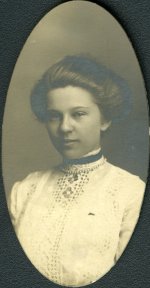
Introduction: The Name of the Lady
Mildred Louise, born in 1895 of a conjunction between a Hammond and an Appleman, was an intelligent, perky, and attractive child in a small but lively and consequential town in southwestern Iowa. She went off to school one morning at the turn of the 20th century when she was either five or six (nobody now alive remembers for sure) and came home Mildrede. She had a sense of play, and she liked that e. She also had a will, and that evening she wrote her name on all her homework as Mildrede. Her mother, a wise woman, let her keep that e. After all, she spelled her name Maude.
Mildred Louise Appleman arrived at school that morning to find herself only one Mildred among three. The teacher, a woman of presence and considerable experience (beyond, as well as within, the classroom), called the roll and promptly recognized the problem. "You Mildreds will give me your full names." The answers, we may reasonably guess, were something like this: "Mildred Louise, Mildred, and Mildred Ann."
It is far too late to ask that teacher why she did not resolve her minor dilemma by saying you will be "Louise, Mildred, and Ann." But we know that she did not, and thereby began a bit of magic in the life of Mildred Louise. She said instead: "Mildred Louise, in this classroom you are Mildred with an e; Mildred, you are Mildred; and Mildred Ann, you are Ann." So it was, and so they were named.
Mildred Louise took that e and used it well. She foreshortened Louise to L. and became Mildrede. Perhaps we dare to say that she sensed that the change would set her apart in the world, as well as in the classroom. In any event, it did: it caught the eye and mind of administrators in schools, banks, hotels, and motels; pursers on cruise ships and stewards on airlines; European and American and Asian hustlers and sophisticates; pay masters, newspaper reporters, post office clerks; the government, corporations, students; and ultimately the mortician and the coroner.
It also marked her off among friends, and earned a second notice during introductions to new acquaintances. One could almost see people think about that e, even when they did not speak their curiosity: "What is going on here? She spells it with an e." One of her dearest friends once laughed and said: "Hell, she loved that e. Maybe she loved it a bit too much, but the rest of us came to love it, too. That was of course because we loved her despite her fobiles."
She was a bit old-fashioned, so it seems appropriate to say that Mildrede used her name to transform her fate into her life. She became symbolically different near the beginning of her life and, with the infusion of much passion and labor, pain, and joy, she became a specific, special human being.
Yes, it is intangible. Even mysterious. Just consider these two stories. After she died, sitting around a table in the vault honoring the formality of opening her safety deposit box, a very shrewd and tough banker tilted back his chair and laughed. "She was one very independent lady. I wouldn't say we exactly cringed when she walked in the door, but we did pay attention. It was like everyone sent out the vibes - 'Here's Mildrede.' I remember once we printed up her checks and left off that e. She came huffing and puffing down to the bank the next morning in a God-awful snowstorm." Another laugh. "She was wearing one of her stylish hats, and it was covered over with snow, and she looked like the tip of the proverbial iceberg. Of course she shook it off in the lobby and then refused to accept the checks. We all shook our heads, and after she'd left we all had a good laugh. But then we damn well changed the checks. Mildred was Mildrede with that e, and that was that."
A bit later, this time after midnight, a woman who had known her for perhaps 65 years was telling a slightly naughty story about how Mildrede had been one of the more memorable flirts in town. It was a tale about the days back during and at the end of World War I when Mildrede was a flapper among flappers. She could swish a skirt so you remembered it.
Her friend took a sip of her drink. "She probably had more proposals of marriage than anyone else in town." A chuckle. "Well, at least more invitations into the bushes."
Another pause, a lovely smile, and just a hint of a tear in the corner of an eye. "I suppose the thing about Milly was that she always seemed to know exactly who she was. No bushes for her. She would let a few of us - particularly your father - call her Milly. But most of the time she was Mildrede with that goddamn e. She even signed her dance cards that way. Oh, we all hated it, and yet we all loved it. Jesus! I wish I'd had that pizazz back then."
Table of Contents
- Introduction: The Name of the Lady
- II. The Voyage to An Identity
- III: Married by Choice and With Passion
- IV: The Joy of Flying
- V: Death, Depression and Recovery
- VI: Another Kind of Depression
- VII: Building Another Life
- VIII: Fulfillment - And Its Costs
- IX: Departure With Dignity


